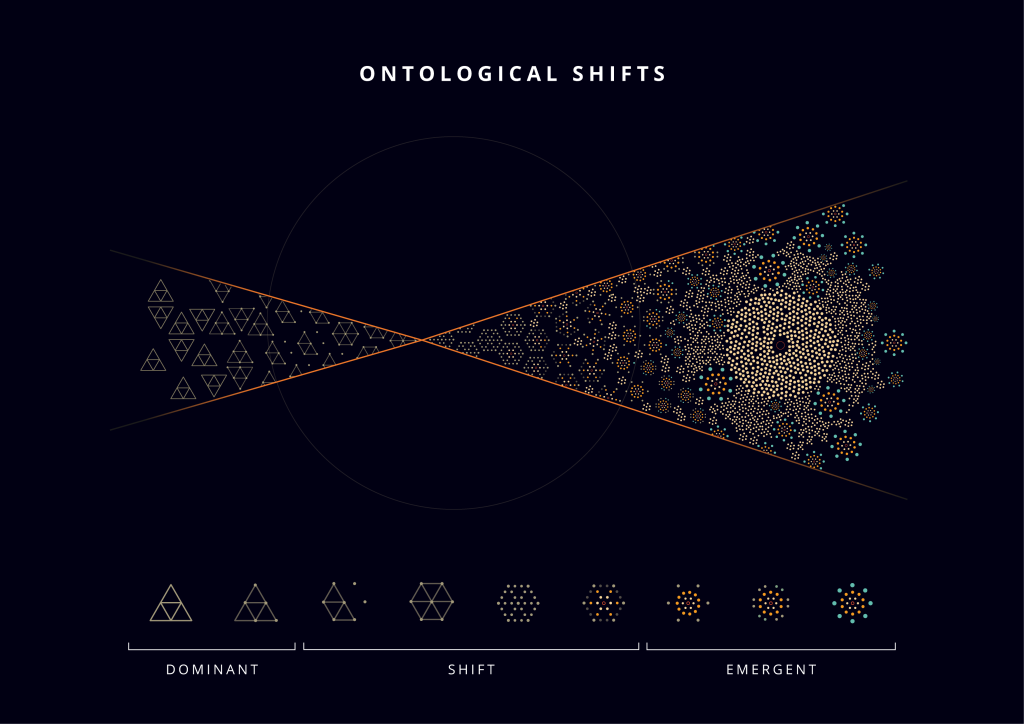With Alnoor Ladha
Alnoor describes the foundations of Justice plus onto shifts and invites a re-examination of how we see, relate and interact with the world.

Justice Plus Onto-Shifts
We need more than economic inclusion, diversity, equity and justice. We call this framework Justice plus onto shifts. What Justice Plus Onto-Shifts tries to do is not simply ask for a seat at the table, but to deconstruct the table, the room and the house of capitalist modernity itself by exposing the traditional conceits of neoliberal logic (and philanthropy as an extension).
Ontology and Approaches
Introduces the importance of ontology—our way of seeing, relating to, and interacting with the world. It emphasizes that how we approach a subject is more critical than the subject itself, suggesting a need for a shift in consciousness to foster new possibilities in justice work.
Material vs. Animistic Worldviews
Contrasts the materialist view which sees the world as inert matter that one is entitled to, with an animistic perspective that recognizes the agency and interconnectedness of all beings. This shift in gaze represents an ontological shift and invites a more respectful and reciprocal relationship with all of life and has implications for justice work.
Complexity and Entanglement
Discusses the complex, entangled, relational nature of existence, showing how we are part of a congress of beings, and that our beingness is influenced by our relations and broader ecological and ancestral networks, pushing for a recognition of our intertwined identities and responsibilities.
The ‘plus’ of Justice plus
stands for Pluralistic, Liberatory, Uniting, Symbiotic Approaches.
Justice as becoming
Justice plus onto shifts is about justice as becoming, as a process, not an end state. It requires continued praxis, decolonization and an examination of the very lenses we use to engage with the world.
Ontological Shifts for Post Capitalist Philanthropy
Outlines specific shifts in perception and being that are necessary for practicing post-capitalist philanthropy, focusing on moving from a the unholy trinity of neoliberal logic- separation, materialism, rationalism- to one that embraces complexity, reciprocity, communal responsibility, and the interconnectedness of all life.
Some ontological shifts discussed
Rationalism to Trans-rationalism
Advocates for incorporating rationalism alongside other ways of knowing, such as intuition and ancestral wisdom, dreams, to achieve a more balanced and holistic perspective.
Monoculture to Polyculture
Argues against the homogenizing forces of capitalism, advocating for a pluralistic approach that celebrates diverse ways of being and knowing.
Ahistorical Amnesia to Remembering, Repairing and Reconciliation
Moving from a disconnected, ahistorical amnesic perspective that doesn’t incorporate the complex, entanglement and harm caused by neoliberalism, to one that recognizes and integrates our deep interconnections with the natural world, each other and our collective histories, and is focused on repair, reconciliation and liberation of all beings.
Attribution and Competition to Service and Solidarity
Central to post capitalist philanthropy and justice plus onto shifts is a move away from the desires for attribution (taking credit, seeking legacy) and competition to creating embodied cultures of humble contribution, reciprocity, service and solidarity. In this way, the reward for service is more service and a deepening of relational ties with the wider web of life.
Entitlement to Entrustment
Shifts the focus from individual entitlement to a collective entrustment with the Earth’s bounty, emphasizing responsibility and stewardship over accumulation and ownership.
From Bureaucracy to Beauty
Critiques the life-draining bureaucracy of neoliberal systems, proposing a reorientation towards beauty and enchantment as foundational to a post capitalist world.
From Trauma to the (Re)Cultivation of Life Force
Addresses the trauma ingrained in modern culture, proposing a focus on (re)cultivating life force and engaging in practices that reconnect us with the vitality and richness of existence.